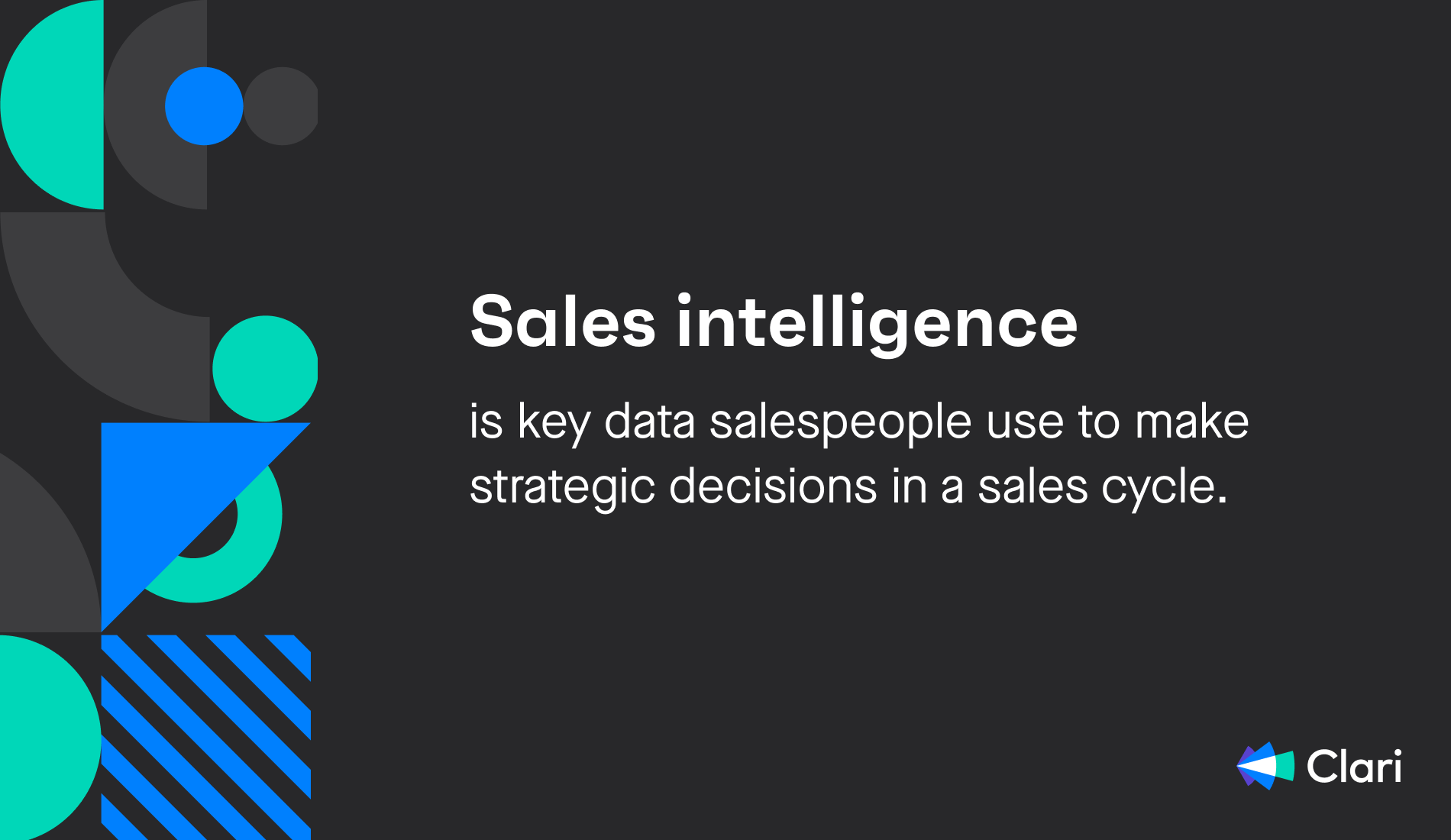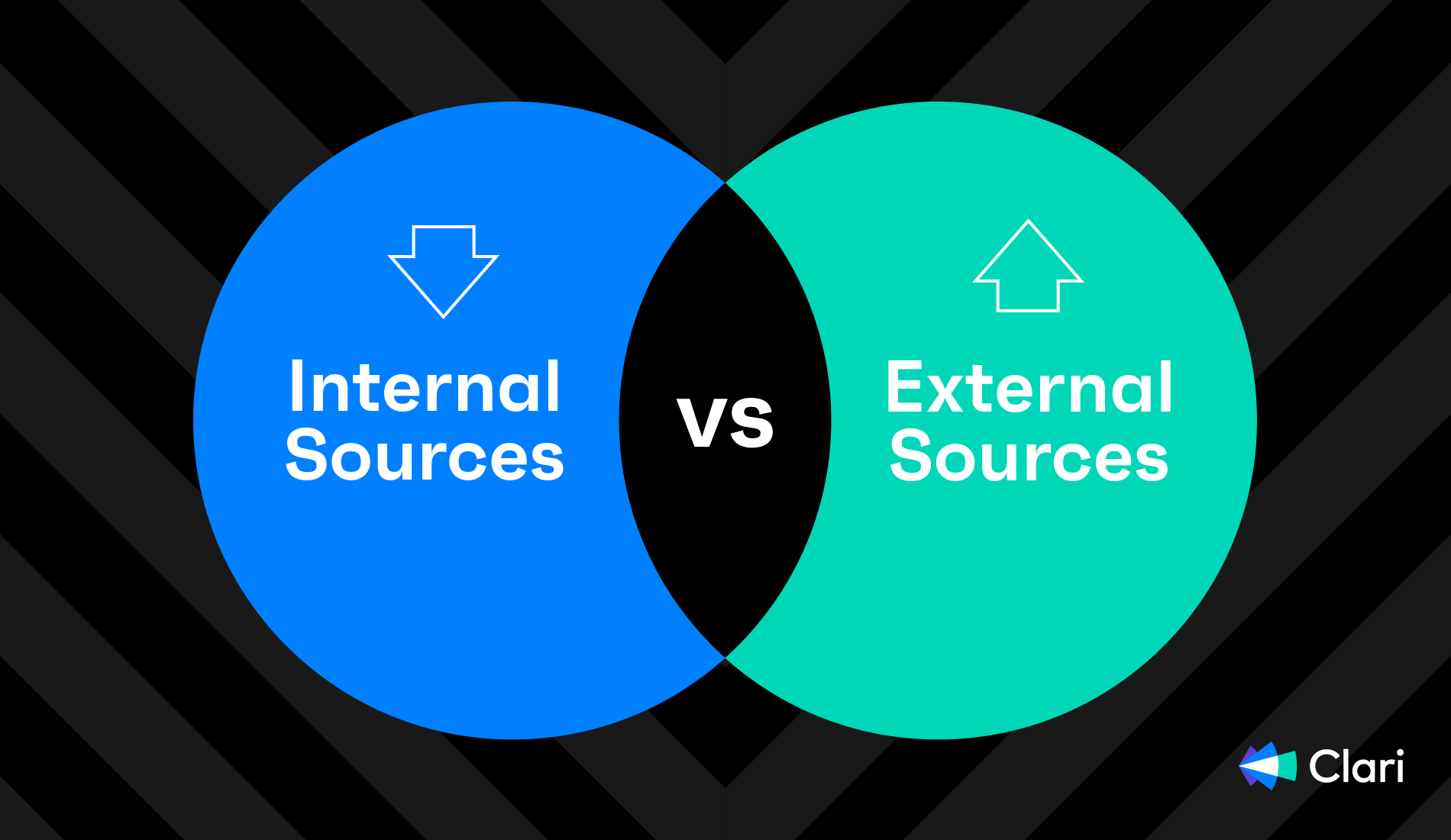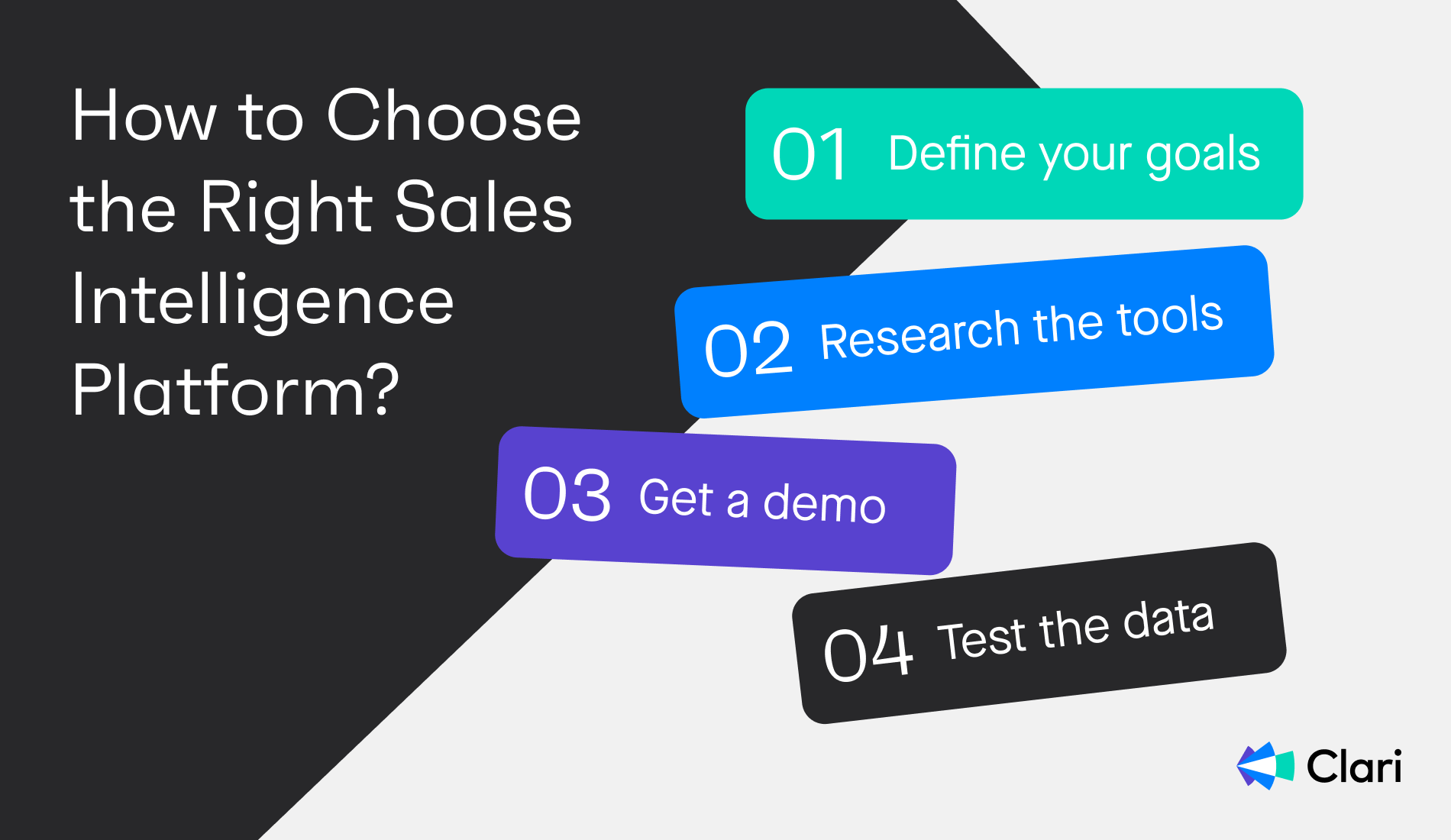Are you trying to reach new sales targets?
Every marketing and sales manager has sales goals and KPIs to hit. But how do the best of the best reach those goals?
With a simple solution: sales intelligence—often the missing piece to elevate your performance.
By the end of 2024, the global sales intelligence market is expected to reach $3.4 billion.
Why? More people are realizing just how impactful sales intelligence is on business growth.
In this in-depth guide, we’ll explore sales intelligence, why it’s important, and how it can help drive sales and grow your business.
Table of Contents:
- What is sales intelligence?
- What is sales artificial intelligence?
- Why is sales intelligence important?
- Sales intelligence key data points
- Where do you collect sales intelligence data from?
- How do you choose the right sales intelligence platform for your own business?
- What are some common sales intelligence platform features?
- How to use sales intelligence data in your own business
- Who should use sales intelligence?
- Sales intelligence and customer relationship management
- What is the difference between sales intelligence and sales enablement?
- What does a sales intelligence analyst do?
- Can sales intelligence help to close more deals?
- What does sales intelligence look like in 2024?
- Use Clari to master intelligence and drive sales
What is sales intelligence?
In its simplest form, sales intelligence is key data salespeople use to make strategic decisions in a sales cycle.

Sales intelligence encompasses everything from the techniques, tools, and best practices to:
- collect sales data
- track sales data
- analyze sales data
This data system allows sales teams to gain valuable insights into target prospects, leads, and customers.
With an effective system in place, you get insights about:
- competitor trends
- market conditions
- new growth opportunities
The result?
Your sales team gets everything it needs to boost your sales in minimum time. Plus, it makes data-backed sales decisions easier than ever.
The powerful features these platforms provide include:
- access to real-time analytics
- predictive insights
- customer segmentation
- visualization tools
- interactive dashboards
What is sales artificial intelligence?
If sales intelligence includes key data salespeople use to make strategic decisions in a sales cycle, what is sales artificial intelligence?
In simple terms, sales artificial intelligence is simply artificial intelligence for sales teams. It’s a broad term that covers any AI that helps sales teams reach their goals. Sales teams use artificial intelligence to simplify and optimize sales processes by leveraging software tools built with machine learning and algorithms that process large datasets.
In this sense, AI tools help sales teams save time, improve productivity, and close more deals.
One reason the term is so closely related to “sales intelligence” is that every major sales platform nowadays has artificial intelligence features and functionality built directly into the software. So even if a system tracks, collects, and interprets the above data, it’s not explicitly doing this using AI.
So technically, most people using sales intelligence tools are most likely using some form of sales AI
The difference is that sales AI covers a wide range of functions:
- performing tasks and sales decision-making functions
- interacting with humans
- interpreting current sales
- interpreting historical sales data
- predicting prospect or customer behavior
- making suggestions for sales team activities
Artificial intelligence is necessary for any sales team that wants to remain competitive. Leveraging AI to simplify, automate, and optimize sales workflows helps save time and boost sales.
Now, let’s dive into what makes these tools so powerful.
Why is sales intelligence important?
Sales intelligence provides access to customer data that points salespeople in the right direction. Your sales team can use this data to understand customer needs and create powerful sales strategies accordingly.
Identifies high-value opportunities
Through predictive analysis, you can identify which prospects are most likely to convert. Being able to focus on high-value opportunities means you can hit your revenue goals more easily.
Provides comprehensive customer profiles
In sales and marketing, understanding who you’re targeting is crucial.
However, knowing their contact information and basic demographics can only take you so far.
With deeper insight into what your customer wants, your sales team can tailor their strategy and approach for maximum impact.
For instance, you can personalize your messaging based on each prospect’s online behavior and preferences.
Creates more effective marketing campaigns
Sales intelligence gives you the type of data you can confidently use to inform your strategies.
Data points like your audience’s interests and online behavior help you create marketing strategies that:
- focus on the right prospects
- craft the right message
- reach out at the right time
Streamlines the sales process
With the insights revealed by intelligent sales data, sales teams can qualify leads based on their conversion probability.
Plus, it gives you real-time data about your leads, allowing you to adjust your strategies as you move forward.
Guides product development
Your sales data can tell you:
- which product features are the most popular among customers
- how your competitor’s product is doing
- about new product opportunities
Information like that equips you to make your product irresistible for the prospects and leads. The result is almost always more conversions and sales.
Provides access to real-time data
With real-time access to a large amount of sales data, you can:
- better segment customers and prospects
- understand market trends
- forecast sales
- adjust your strategies
Sales intelligence key data points
Data is the backbone of sales intelligence. It gives you a clear profile of your target audience.
To be effective, you need to collect the right data points.
Here are some of the most important data types for sales and revenue teams:
Contact details
You need accurate contact details to connect with your leads at different marketing touchpoints.
Also, this information can change over time as your leads get promoted or shift jobs.
So, for effective targeting, you need an intelligent sales platform that can update the contact information in real time.
Demographics
One of the first things you need to know about your target audience is its demographics. You need to know key data on your target audience like:
- age
- gender
- location
- income
- education
- occupation
From a company standpoint, it includes everything from their location, size, industry, and business years.
Company (or account) data
Firmographic data is crucial to allocate your resources wisely. It helps you understand the companies you’re targeting by giving insights into their:
- industry position
- sales revenue
- number of employees
Having enough information about your target audience (contact and company) helps you forecast more accurately. As a result, you can craft more effective strategies and move in the right direction.
Purchase habits and history
Someone’s online purchase habits tell you a lot about their preferences. You can offer personalized recommendations to your target audience by tracking their purchase history.
For instance, if someone buys a pair of running shoes, you can recommend a related running apparel.
Purchase history lets you predict behavior patterns and make accurate sales forecasts.
Intent data
In marketing and sales, the “Intent” of the target audience matters a lot: It tells you where your target customer is in their journey.
For instance, they might be consuming helpful content around your product. In that case, pitching your product as a viable solution isn’t the best strategy. Instead, sales reps should only pitch when a target customer is likely to go through with the purchase. However, ensuring you slide into their DMs before the competitor is also important.
So, use a reliable revenue intelligence platform to gather intent data and inform your outreach.
Technographic data
Technographic intelligence involves finding the technology your target audience is using, such as their hardware and software.
This may also offer details about when the company or prospect purchased specific technologies.
When paired with an effective sales strategy, technographic intelligence can help you boost your conversions. The benefits of technographic data include:
- improved segmentation
- more specificity
- effective lead prioritization
Sales event triggers
Sales event triggers are important data points to keep track of.
Why?
Because these are triggers that tell you there’s a conversion opportunity.
For instance, a buyer intent signal allows you to convert a specific lead on time. Having this type of data helps businesses make profitable sales decisions and stay ahead of rivals.
Where do you collect sales intelligence data from?
Now that we’ve covered the different data points like demographics, purchase habits, and company contact info, let’s dive into where you can collect this data.
The reality is that there’s no single data source. You can get it from a variety of sources and they all fall into one of two camps: internal and external.

Internal data sources
- past customer interactions
- data collected during sales calls from prospects
- using a CRM to collect company or personal contact information
External data sources
- third-party customer data
- public and private archives and databases
- social media
You can use all (or a combination) of these internal and external sources for sales data to inform your sales strategy and generate more revenue.
This is especially important to ensure you’re leveraging different technology and automations to track data actively and passively. For example, we mentioned how artificial intelligence plays a role in sales above. When collecting sales data, you can use AI with Clari’s AI assistant to extract data from conversations to give you insights on what to say in real time. Using Clari’s AI functionality in selling is a great tactic to boost conversions, offer instant feedback, and coach sales reps during a live call when they need a helping hand.
Many sales teams rely strictly on manually entering sales-related data into their databases, spending dozens of hours each week. Unfortunately, manual data entry can take up a ton of time that could be better spent building relationships with prospects and hopping on sales calls to close deals.
With a revenue operations and intelligence platform like Clari that can automatically enhance your internal data, you’re able to scale sustainably. Some tools can crawl external data sources and filter the data before storing it, so you can save time in the process.
Now that you know how you can source sales data, we’ll cover how to pick the right platform.
How do you choose the right sales intelligence platform for your own business?
To pick the right platform, you need to carefully consider its potential. But what features should you look at, and how do you pick the right platform for your business needs?
Let’s talk about that.
Define your goals
One of the first things you should do before selecting a tool is to get clarity on your goals: When you know what you want to achieve, you’ll know which features can help you.
For instance, you may want to:
- target better prospects
- improve lead generation
- collect more valuable data
- identify buyer intent signals
Research the tools
When selecting a tool, consider the following:.
Data accuracy
Start by making sure the platform is a reputable one that will provide accurate data. You can’t make effective sales decisions based on inaccurate or out-of-date information.
Integrations
Integration with CRMs and other automation tools can have several benefits:
- easily onboard Clari
- help get your users up to speed fast
- avoid duplicating efforts
Make sure the platform integrates with the CRM your business is using (or planning to use).
User interface usability
You don’t want to spend time and money on a tool that no one will be able to use. It should be simple enough to understand so that you can start growing your business without wasting much time.
Customer support/training
Even when a platform has a user-friendly interface, you may have to learn to use it effectively.
You should pick a platform that has plenty of online resources available to help you:
- knowledge base
- tutorials
- FAQs
In addition, customer support should be able and responsive.
Competitive pricing
It shouldn’t cost an arm and a leg.
Make sure you’re not investing more than you should by investing in a platform that offers exactly what you need.
Ensure the pricing will allow you to scale efficiently without running into financial roadblocks down the road.
Great reviews
Once you know the features you need, it’s time to narrow your choices down.
Your next step should be reviewing reviews on reliable third-party sites like G2, TrustRadius, and Capterra.
Read what real customers have to say about the platform. They’ll give you insider tips and negatives the platform won’t.
Get a demo
By now, you should have at least two to three options. Get in touch with their sales team and request a demo.
Try it out
Take their platform for a spin and get the most out of the demo. Based on what you want from the platform, prepare a few questions for the sales team.
Some important questions to ask are:
- Is your data accurate?
- What insights can I deduce from your data?
- How fast does an average customer achieve their ROI goals with your platform?
- How much does it cost?

What are some common sales intelligence platform features?
Common features you can expect in a sales intelligence platform include customer segmentation capabilities, lead scoring, data enrichment features, and forecasting tools. Let’s talk about each of these in more detail.
Customer segmentation
Your sales platform should be able to split up your customers into different segments. You should be able to segment them by different criteria like:
- industry
- behavior
- preferences
- demographics
- purchase history
You can run impactful marketing and sales campaigns by splitting your audience into different sub-audiences.
Lead scoring
Not all leads are created equal. Your platform should have lead scoring capabilities to rank leads based on your predetermined criteria, like buying signals, engagement level, and ideal customer profile (ICP).
Plus, with Clari’s recent addition of Groove, sales teams can automate many of the most time-consuming (and repetitive) aspects of the sales cycle. By automating certain prospecting and follow-up activities, teams can streamline their revenue workflows and close more deals.
Data enrichment
Your intelligence software should be able to automate data enrichment by updating customer profiles and data points with new information such as social media profiles, names, numbers, websites, and more.
Sales forecasting
With in-depth data capture and sales forecasting you can see what’s ahead in the pipeline. It analyzes market trends, historical data, and predictive analytics to predict future revenue performance.
How to use sales intelligence data in your own business
Here’s how to incorporate sales data into your business to get ahead of the competition.
Build your ideal customer profile
If you want to remain competitive, static demographic data isn’t enough. You need to consistently update your ideal customer profile in this fast-paced market.
With a good sales tool, you can keep your ICP up to date with the following information:
- purchase triggers
- intent
- technology used
- content consumed
Enhance sales prospecting
Sales data is all about understanding the customer journey.
For instance, a sales trigger tells you when someone is at the bottom of your marketing funnel.
The real-time information you get about your leads helps you make timely decisions for maximum conversions.
Identify cross-selling and up-selling opportunities
Cross-selling and up-selling are perfect ways to maximize revenue and boost customer lifetime value.
With the right sales platform, you can track behavior, segment customers, and personalize experiences.
For instance, if someone buys running shoes, there’s a good chance they’ll need a running belt, reflective gear, a fitness tracker or smart watch, and other running accessories.
This allows you to focus your marketing efforts on prospects most likely to convert.
Acquire key competitor insights
Knowing what your competitors are up to is as important as understanding your target audience. With these insights, you can:
- identify new competitors in your market
- monitor their marketing campaigns
- understand their past actions and current strategies
- create benchmarks
The more you monitor and understand your competitors, the easier it is to identify competitive threats and develop counter-strategies.
Who should use sales intelligence?
Simply put: sales teams.
Or, actually, every single person on your sales team. From sales managers to reps, they’ll be able to make more informed, data-backed decisions.
Here are the main team members who you should expect to use it the most:
Sales managers
Managers oversee and guide the sales ship within an organization. A sales platform gives them access to critical information about::
- customer behavior
- market trends
- performance metrics
This helps sales managers set realistic goals and make informed decisions.
Sales development reps
The role of a sales rep is to identify and contact leads. To do that effectively, they need up-to-date insights about your target customers’:
- pain points
- preferences
- purchasing behavior
This helps them personalize their outreach, engage prospects more effectively, and drive more conversions.
Lead generation specialists
As the name suggests, lead generation specialists use marketing strategies to capture and nurture leads.
With actionable data about your target audiences, these specialists can generate more leads. It offers them:
- demographic information
- firmographics
- contact details
- behavioral insights
- lead scoring
- competitive insights
Lead generation experts can use these insights to target the right people and personalize their outreach for maximum results.
Revenue ops teams
Leveraging sales data enables the revenue ops teams to streamline sales operations.
By leveraging data, they can also automate repetitive tasks and maximize efficiency.

Sales intelligence and customer relationship management
The performance of your customer relationship management (CRM) software and sales platform are interdependent.
How can you use a sales tool to get the most out of your CRM software? And do they need to integrate seamlessly with one another?
Simply put, sales tools can enrich your CRM data and make it more relevant and useful.
But, some information about your target customers is ever-changing. For instance, individuals can switch companies, and businesses can be acquired.
A good sales platform will dynamically update this data for you and fill in any gaps in your CRM. This is why it’s crucial to ensure the two can integrate with each other.
What is the difference between sales intelligence and sales enablement?
Now that we know the difference between a sales platform and CRM software, what about sales enablement? How does that fit into the picture?
Sales enablement focuses on the tools and training that help sales teams close more leads.
Simply put, intelligence tools offer sales insights that help teams develop goals and strategies, while enablement tools help them implement those strategies.
Think of sales intelligence as part one of the sales strategy, and sales enablement is part two: training and executing with tools, training, and team development.
While the two are often used interchangeably, they have two distinct meanings. Both aim to help sales teams hit their sales targets and drive revenue.
One way to think about sales intelligence and sales enablement is by thinking about sports.
Picture your favorite professional sports team, whether it’s football, basketball, baseball, or something else entirely.
Sales intelligence tools would have all the data you need to collect and analyze to help your team advance, such as:
- player stats
- team win-loss record
- field/court conditions
- weather
- fanbases
The more the owners, managers, and coaches know about these data points, the more they can direct the team's overall direction and game strategies to help it win.
On the other hand, sales enablement is the:
- sports equipment
- jerseys
- coaching staff
- training facilities
- arenas
- development programs
Every professional sports team works within both realms to ensure they have the data and the tools to execute an effective strategy to win the championship every year.
The same is true for your sales team.
You need the data, statistics, and analytics, as well as the training, development, and tools to reach your sales targets and build a winning sales strategy.
In the fast-paced business world, only sales departments who take this two-pronged approach to sales strategy—leveraging data and tools—can compete and reach their sales goals.
What does a sales intelligence analyst do?
A sales intelligence analyst analyzes customer and sales data and shares insights with the rest of the team. Their role is one of the most important on a sales team. By analyzing and interpreting sales data, they help sales teams better understand customer behavior, competitor trends, market trends, and business growth opportunities.
Their role centers around analyzing and reporting:
- key performance indicators (KPIs)
- monthly, quarterly, and annual sales revenue
- actionable insights to sales leaders and teams
Analyzing and interpreting this data allows leaders to make decisions based on actual data rather than intuition.
These analysts tend to be responsible for::
- setting up sales analytics dashboards and time-based reports
- creating self-service dashboards for salespeople
- identifying upsell and cross-sell opportunities
- support strategic planning and commission-based plans for managers to offer sales reps
- partnering with business intelligence in lead scoring
- helping with sales pipeline optimization by analyzing bottlenecks and finding ways to improve the funnel
- other ad-hoc tasks involving sales data and trends
Intelligence analysts often work closely with sales managers on strategic planning, marketing efforts, and other sales matters.
Can sales intelligence help to close more deals?
If you’re looking to close more deals, then sales intelligence is one of the best tools to lean on.
Here’s how it can help you close more deals:
Create an ICP
Every business needs an ideal customer profile. No business can succeed without knowing its target audience.
Use sales intelligence to identify your ICP. You can do that by analyzing the data it provides about your existing customers.
Get accurate customer data
Intelligent sales tools can help you keep your customer data fresh and clean.
There’s no need to check the data for accuracy manually. Just integrate it with your CRM, and you’ll be ready.
Improved lead scoring
When you know a lead isn’t likely to become a customer, you’ll know to invest your resources elsewhere. This is one of the main ways sales tools can improve conversions, by letting sales teams know where to focus their attention.
Better messaging and outreach
With sales intelligence at your back, the contact data of your leads remains fresh and up to date.
As a result, you’re most likely to reach the right prospects with an outreach strategy.
And, since you understand their pain points, getting the messaging right is easier.
Speed up sales cycles
Sales intelligence gives you the information you need to contact the most relevant people. With accurate contact details, you’re most likely to reach decision-makers and speed up your sales cycles.
Improve sales forecasting
Success in sales requires effective forecasting and resource allocation.
With it, your sales team is able to make more accurate predictions. You can use this data to close more deals in a shorter span.
What does sales intelligence look like in 2024?
As mentioned above, the global market value for intelligent sales tools will grow to $3.5 billion by the end of 2024.
And with advancements in AI, it’s not expected to slow down anytime soon.
Sales intelligence is going to increasingly rely on AI and machine learning to provide sales teams and leaders with a deeper understanding of:
- target customers
- market trends
- competitors and threats
This data can come from a variety of sources, including:
- buying intent
- customer profiles
- buying habits
- sales triggers
Artificial intelligence then analyzes this data to filter out the leads most likely to buy from you.
AI and machine learning will continue to play their part in helping businesses find and target the most relevant people.
And in time, AI and machine learning will become even more powerful, helping businesses drive even more sales and revenue.

Use Clari to master intelligence and drive sales

Sales intelligence tools help you and your sales team make well-informed decisions. It collects and analyzes sales data to rank your most qualified leads.
With the insights you can get from a platform like Clari, you can tailor your outreach strategies for maximum impact.
Other benefits include:
- custom automation
- targeted outreach
- cost and time savings
- streamlined workflows
- competitive advantage
By streamlining and automating your sales workflow, you can hit your sales targets faster and get a leg up on the competition.
How?
By leveraging an all-inclusive revenue operations and intelligence platform like Clari’s, you can make more sales in less time.
Want to see how Clari can help you close more deals and drive sales? Request a demo today.




